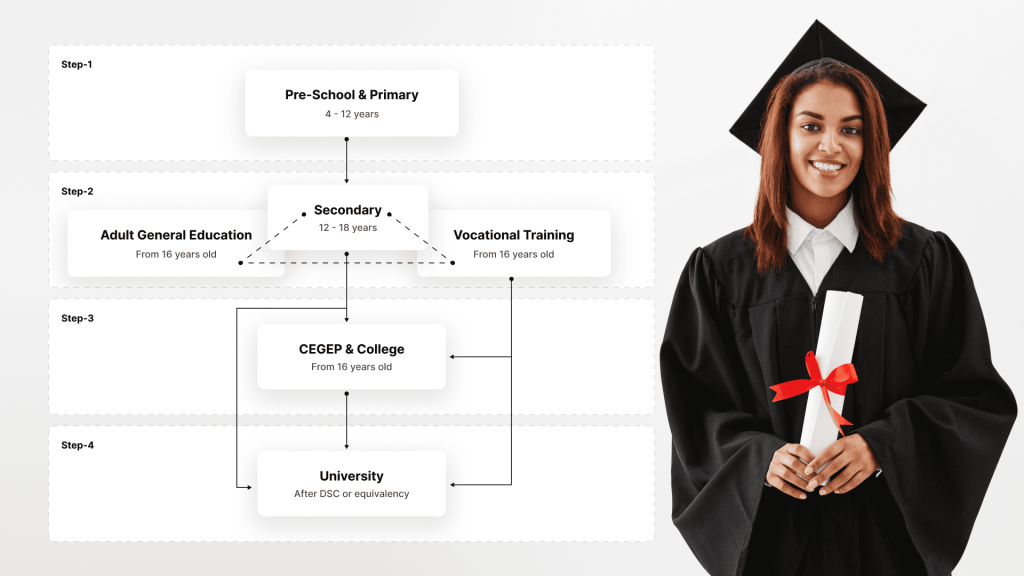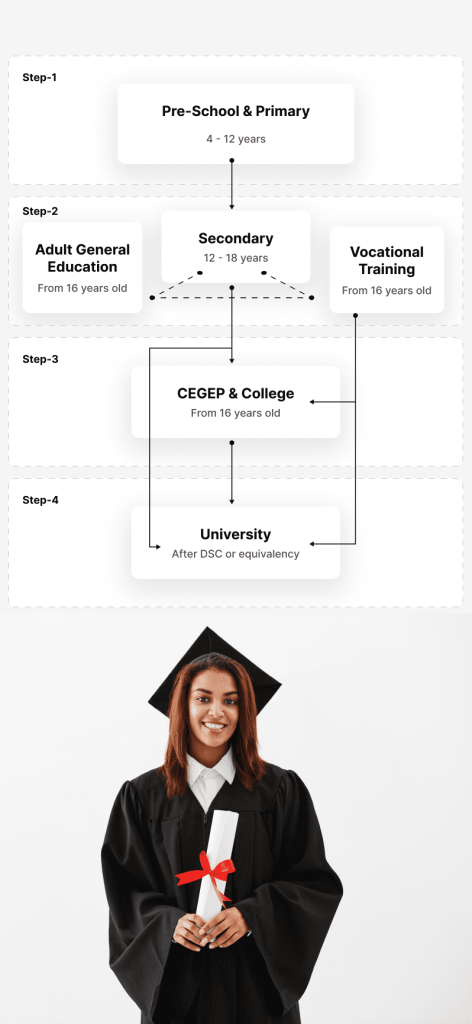Kindergarten
Compulsory school attendance
School obligations
Private schools
There are many ways to get involved as a parent at school. Here are some ways to Take action as a parent.
Complaint concerning sexual violence
A complaint concerning an act of sexual violence may be made directly to the regional student ombudsman, omitting the first two steps of the process. These complaints are fast-tracked.
The regional student ombudsman forwards the complaint to the educational institution, unless he or she has reasonable grounds to believe that this would hamper the investigation, or the complainant objects to the transmission of the complaint.
To file a complaint, you must first contact the person directly concerned or his or her immediate superior.
You can make your complaint verbally first, but make sure it’s also made in writing (e-mail). This will keep a record of the exchanges and make it easier to calculate the time required for processing.
The person receiving the complaint has 10 working days to respond.
If you remain dissatisfied with the handling of your complaint, or if the 10-working-day time limit has passed, you must contact the person responsible for handling complaints at the school service center, school board or private educational institution.
Keep a record of the steps you’ve taken. Complaints must be processed within 15 working days.
If you are still dissatisfied with the way your complaint has been handled, or if the 15-working-day time limit has passed, you should contact the Regional Student Ombudsman in your area. The ombudsman will assist you in formulating your complaint in writing.


Audet, Geneviève, and Marie Mc Andrew. 2020. « Inégalités dans les trajectoires scolaires des élèves québécois issus de l’immigration: le rôle des dynamiques sociales, systémiques et scolaires ». Mélanges CRAPEL, no 41/1.
Bellemare, Jacques. 1988. « Enquête sur les relations entre les corps policiers et les minorités visibles et ethniques: rapport final du Comité d’enquête à la Commission des droits de la personne du Québec ». Montréal: Commission des droits de la personne du Québec.
Bernard, Léonel, and Christopher McAll. 2004. « La surreprésentation des jeunes Haïtiens dans le système québécois de protection de la jeunesse ». Intervention, no 120, 117‑24.
———. 2010. « Jeunes Noirs et système de justice : la mauvaise conseillère ». Revue du CREMIS 3 (1): 7‑14.
Borri-Anadon, Corina, and Tya Collins. 2023. « Entre surveillance disproportionnée et inaction à l’égard d’élèves issus de l’immigration considérés à besoins éducatifs particuliers : une recherche ethnographique ». La nouvelle revue – Éducation et société inclusives N° 95 (février):25‑42. https://doi.org/10.3917/nresi.095.0025.
Borri-Anadon, Corina, Tya Collins, and Marilyne Boisvert. 2018. « Pratiques d’évaluation en contexte pluriethnique et plurilingue : démarche d’accompagnement d’orthophonistes scolaires ». Recherche & formation 89 (3): 45‑56. https://doi.org/10.4000/rechercheformation.4357.
Borri-Anadon, Corina, Julie Larochelle-Audet, Maryse Potvin, and M. Mc Andrew. 2014. « Bilan et enjeux de la formation initiale à la diversité ethnoculturelle, religieuse et linguistique en enseignement au Québec ». Canadian Diversity/Diversité canadienne, no 11(2), 59‑64.
Bressoux, Pascal. 2003. « Jugements scolaires et prophéties autoréalisatrices : anciennes questions et nouvelles réponses ». https://doi.org/10.3406/dsedu.2003.1028.
Charette, Josée. 2018. « Représentations sociales sur l’école et stratégies déployées par des parents récemment immigrés pour soutenir l’expérience socioscolaire de leurs enfants dans la société d’accueil : regards croisés de parents et d’intervenants ». Recherches qualitatives 37 (1): 117. https://doi.org/10.7202/1049458ar.
Collins, Tya, and Corina Borri-Anadon. 2021. « Capacitisme et (néo)racisme au sein des processus de classement scolaires au Québec : interprétations par les intervenants des difficultés des élèves issus de l’immigration ». Recherches en éducation, no 44 (mars). https://doi.org/10.4000/ree.3337.
Collins, Tya, and Marie-Odile Magnan. 2018. « Post-secondary pathways among second-generation immigrant youth of Haitian origin in Quebec ». Canadian Journal of Education/Revue canadienne de l’éducation 41 (2): 413‑40.
Comité consultatif sur l’intégration et l’accommodement raisonnable en milieu scolaire. 2007. « Une école québécoise inclusive: dialogue, valeurs et repères communs ». Ministère de l’Éducation, du Loisir et du Sport (MELS).
Commission des Droits de la Personne et des Droits de la Jeunesse. 2020. « Bilan de la mise en œuvre des recommandations du Rapport de la consultation de la commission des droits de la personne et des droits de la jeunesse sur le profilage racial et ses conséquences ». Montréal: Commission des Droits de la Personne et des Droits de la Jeunesse (CDPDJ).
Commission des Droits de la Personne et des Droits de la Jeunesse (CDPDJ). 2011. « Profilage racial et discrimination systémique des jeunes racisés ». Commission des Droits de la Personne et des Droits de la Jeunesse.
Commission spéciale sur les droits des enfants et la protection de la jeunesse. 2021. « Instaurer une société bienveillante pour nos enfants et nos jeunes ». Montréal: Commission spéciale sur les droits des enfants et la protection de la jeunesse.
Dubet, François. 2007. « Préface ». In La deuxième génération issue de l’immigration: une comparaison France-Québec, 7‑16. Athéna éd. https://id.erudit.org/iderudit/019889ar.
Jean-Pierre, Johanne, and Tya Collins. 2022. « Penser une démarche épistémologique afroémancipatrice en recherche qualitative par, pour et avec les communautés noires ». Recherches qualitatives 41 (1): 13‑34. https://doi.org/10.7202/1088793ar.
Kanouté, Fasal, Justine Gosselin-Gagné, Rajae Guennouni Hassani, and Christine Girard. 2016. « Points de vue d’élèves issus de l’immigration sur leur expérience socioscolaire en contexte montréalais défavorisé ». Alterstice 6 (1): 13‑25. https://doi.org/10.7202/1038275ar.
Lafortune, Gina. 2019. « Les Jeunes d’origine Haïtienne Au Cégep : Un Rapport Aux Études Marqué Par Le Genre ? » Canadian Journal of Sociology 44 (4): 343‑72. https://doi.org/10.29173/cjs29492.
———. 2021. « De l’inclusion et de la réussite au collégial: « Au fond, vous voulez savoir ce que ça veut dire être noir.e au cégep? » ». Les Cahiers de l’IRIPI, no 3, 8‑15.
Lafortune, Gina, Marie-Ritchie Prosper, and Keslie Datus. 2020. « Défis de réussite et enjeux de prise en compte de la diversité au collégial : expériences d’étudiant⋅e⋅s d’origine haïtienne ». Revue des sciences de l’éducation 46 (2): 14‑38. https://doi.org/10.7202/1073717ar.
Larochelle-Audet, Julie. 2019. « Organisation et re-production des rapports de domination dans les distributions dissymétriques du travail enseignant : une enquête du point de vue d’enseignant·es de groupes racisés ». Thèse de doctorat, Université de Montréal. https://papyrus.bib.umontreal.ca/xmlui/handle/1866/22439.
Magnan, Marie-Odile. 2023. « La voix des étudiantes et étudiants noirs au sujet des rapports sociaux de race à l’université au Québec ». Relais. La revue de vulgarisation scientifique sur la réussite en enseignement supérieur, 1, no 1. https://archivesoresquebec.ca/id/eprint/318/.
Magnan, Marie-Odile, Fahimeh Darchinian, and Émilie Larouche. 2017. « Identifications et rapports entre majoritaires et minoritaires. Discours de jeunes issus de l’immigration ». Diversité urbaine 17:29‑47.
Magnan, Marie-Odile, Annie Pilote, Tya Collins, and Pierre Canisius Kamanzi. 2019. « Discours de jeunes issus de groupes minoritaires sur les inégalités scolaires au Québec ». Diversité urbaine 19:93‑114. https://doi.org/10.7202/1065122ar.
Mc Andrew, Marie. 2000. « Relations ethniques, pluralisme et égalité : le rôle de l’école [leçon inaugurale] ». Université de Montréal.
McAndrew, M., A. Balde, M. Bakhshaei, K. Tardif-Grenier, G. Audet, F. Armand, S. Guyon, and al., éd. 2015. Réussite éducative des élèves issus de l’immigration : Dix ans de recherche et d’intervention au Québec. La Réussite éducative des élèves issus de l’immigration : Dix ans de recherche et d’intervention au Québec. Paramètres. Montréal: Presses de l’Université de Montréal. https://books.openedition.org/pum/3005.
McAndrew, Marie. 2010. Les majorités fragiles et l’éducation. Les majorités fragiles et l’éducation : Belgique – Catalogne – Irlande du Nord – Québec. Thématique Sciences sociales. Montréal: Presses de l’Université de Montréal. https://doi.org/10.4000/books.pum.8406.
McAndrew, Marie, Jacques Ledent, and Jake Murdoch. 2011. « La réussite scolaire des jeunes Québécois issus de l’immigration au secondaire ». Recherche. Montréal: CEETUM, Centre d’études ethniques des universités montréalaises, Chaire de recherche du Canada sur l’Éducation et les rapports ethniques, Université de Montréal.
Ministère de l’Éducation, du Loisir et du Sport (MELS). 2006. « Portrait scolaire des jeunes issus de l’immigration: de 1994-1995 à 2003-2004 ». Ministère de l’Éducation, du Loisir et du Sport (MELS). https://www.education.gouv.qc.ca/fileadmin/site_web/documents/dpse/immigration_fr_460758.pdf
Potvin, Maryse. 2007. « Blackness, haïtianité et québécitude : modalités de participation et d’appartenance chez la deuxième génération d’origine haïtienne au Québec ». In La deuxième génération issue de l’immigration. Une comparaison France-Québec, Athéna éditions, 137‑70.
———. 2015. « L’école n‘est pas neutre: diversité, discriminations et équité à l’école québécoise ». In Les fondements de l’éducation. Perspectives critiques, 381‑448. Montréal: Multimondes.
———. 2016. « Interethnic relations and racism in Quebec ». In Quebec questions: Québec studies for the 21st century, Deuxième édition, 267‑86. Londres: Oxford University Press.
Potvin, Maryse, and Jean-Baptiste Leclercq. 2014. « Facteurs affectant la trajectoire scolaire des jeunes de 16-24 ans issus de l’immigration en formation générale des adultes ». Revue des sciences de l’éducation 40 (2): 309‑49. https://doi.org/10.7202/1028423ar.
Potvin, Maryse, Marie-Odile Magnan, Julie Larochelle-Audet, and Jean-Luc Ratel. 2021. La diversité ethnoculturelle, religieuse et linguistique en éducation : théorie et pratique. Montréal: Fides éducation. https://eduq.info/xmlui/handle/11515/39049.
Potvin, Maryse, and Mary McAndrew. 2010. « L’éducation à l’égalité et à l’antiracisme en milieu scolaire francophone à Montréal ». In Les faces cachées de la recherche interculturelle: de la rencontre des porteurs de cultures, L’Harmattan, 163‑83.
Potvin, Maryse, Maryse McAndrew, and Fasal Kanouté. 2006. « L’éducation antiraciste en milieu scolaire francophone à Montréal: diagnostic et prospectives ». Montréal: Centre d’études ethniques des universités montréalaises.
Thésée, Gina, and Paul Carr. 2016. « Les mots pour le dire: acculturation ou racialisation? Les théories antiracistes critiques (TARC) dans l’expérience scolaire des jeunes NoirEs du Canada en contextes francophones ». Comparative and International Education 45 (1). https://doi.org/10.5206/cie-eci.v45i1.9284.
Valade, Véronique. 2021. « Parcours d’étudiants racisés à l’université au Québec : le cas d’étudiants montréalais d’origine haïtienne ». Mémoire de maîtrise, Montréal: Université de Montréal. https://papyrus.bib.umontreal.ca/xmlui/handle/1866/25701.
This tool provides an overview of the education system in Quebec. By highlighting the barriers hindering the success of Black youth, we aim to break their isolation. To equip them as well as their parents, school stakeholders and community organizations, we also share initiatives that promote educational success. For this effort toward social justice in schools to succeed, it is essential to mobilize members of Black communities.
Research and Writing
Réginald Fleury, M.Ed.
Direction
Réginald Fleury, M.Ed.
Bélinda Bah, Ph.D.
Graphics and Development
Oshara Inc.
Extracts may be reproduced for non-commercial purposes, provided the source is acknowledged. Any partial reproduction must be faithful to the text used.
To quote this document
Fleury, Réginald. 2024. « Parcours scolaires au Québec: enjeux, obstacles et réussites des jeunes noir.e.s ». Observatoires des communautés noires du Québec. 2024. https://parcoursscolaire.sdesj.org
Funded by the Lucie and André Chagnon Foundation, the Observatory of Black Communities in Quebec is an initiative of the Afro Youth Summit that documents the socio-economic realities of Afro-Quebecers to contribute to their advancement. It aims to address the concerns of Black communities and grassroots actors through participatory research methods.